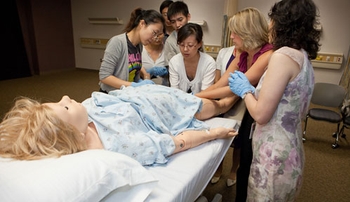It seems we are in similar places. Like the U.S., China looks to enact some version of health care reform. It does so in part because, like the U.S., it faces a shortage of primary care providers in rural areas.
And so, nearly 20 physicians from China are in Omaha to take part in a family medicine “training camp” at UNMC.
 |
Chinese physicians conduct a simulated child birth in the Sorrell Center’s Clinical Skills Lab as part of a family medicine training camp underway this week at UNMC. |
Rural exodus
Qing Yong Ma, M.D., Ph.D., is a surgeon and dean of education at Xi’an Jiaotong University. In China, after eight years of training, many physicians opt to practice in big cities, he said.
It is hoped that perhaps by offering an alternate five-year program, and government support, more might return to their hometowns to practice rural family medicine.
Mindset shift needed
But providers aren’t the only ones who need to change to enact reform. The Chinese countryside has an historic tradition of “barefoot doctors.” Many rural people have the mindset that city physicians are superior when it comes to modern, educated care. This leads to travel, back-ups, long waits.
New rural family practice docs must win the trust of their potential patients, Dr. Ma said.
A place to practice
They practice those skills here, thanks in part to Problem Based Learning exercises. Paul Paulman, M.D., assistant dean for clinical skills and quality in the UNMC College of Medicine, praised the doctors’ ingenuity: “You took over the teaching,” he said.
They are hoped to be the seeds in a project that would eventually train 10,000 doctors in family practice techniques.
How would you deal with that?
One role-playing exercise had a physician visit an angry “patient” who insisted she be given antibiotics. The young woman to portray the patient seemed a friendly, effervescent, girl-next-door type. How could she do angry?
But at “go,” she started to berate the doctor in a Chinese dialect. The assembled class roared with laughter and a spirited discussion soon followed. How would you handle that? What should have been done?
It was clear in any language: The adjustment to a new future in primary care won’t be easy, in either country. But at UNMC, both countries will do everything possible to be ready for anything that comes.